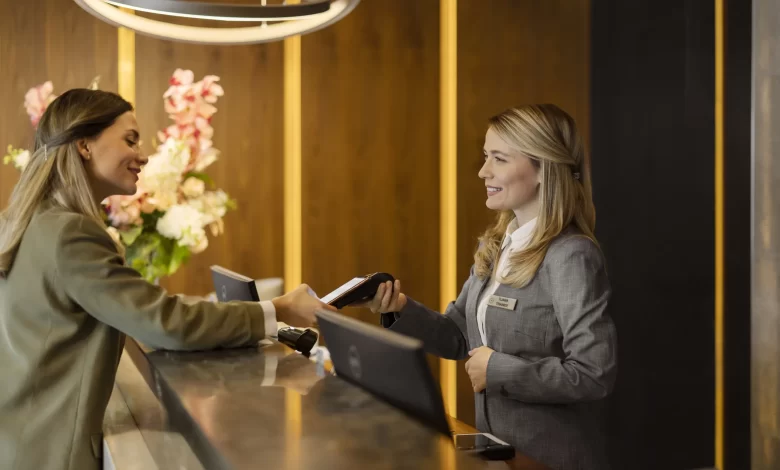7 Hospitality Technology Products and Their Role in Enhancing Guest Experience

The hospitality industry, traditionally driven by human-centric services, has undergone a significant transformation with the advent of technology. Modern travelers now expect convenience, personalization, and seamless experiences from the hotels and hospitality businesses they visit. As a result, hospitality technology products are now crucial in elevating the guest experience while streamlining operational efficiency. From automated check-ins to smart room controls, technology is reshaping the way guests interact with hotels, creating lasting impressions that fuel guest satisfaction and loyalty.
1. Self-Service Kiosks and Mobile Check-In
One of the most prominent technological innovations in hospitality is the self-service kiosk and mobile check-in system. Traditionally, the check-in process required guests to wait in line, complete paperwork, and interact with front desk staff. However, with the introduction of self-service kiosks and mobile apps, this process has become faster and more convenient.
Guests can now check into their rooms via mobile apps before they even arrive at the hotel. Once they reach the property, they can bypass the front desk entirely by using kiosks or unlocking their room doors with digital keys sent to their smartphones. This not only enhances the guest experience by minimizing wait times, but also provides an element of personalization, as many mobile apps offer options to select rooms or request specific amenities in advance.
2. Smart Room Technology
Smart room technology is one of the most exciting advancements in hospitality, designed to create a customized and interactive stay for guests. Through the integration of Internet of Things (IoT) devices, hotels can offer guests the ability to control various in-room features such as lighting, temperature, and entertainment systems via a mobile app or voice commands.
For example, guests can adjust the room’s thermostat, draw the blinds, or select their preferred lighting mood—all from the convenience of their smartphone or an in-room tablet. Many smart rooms also come equipped with voice assistants, such as Amazon Alexa or Google Assistant, allowing guests to make requests, ask for hotel services, or even control the television simply by speaking.
The personalized nature of these smart rooms creates a sense of luxury and control for the guest. For instance, a business traveler can adjust the room’s ambiance to suit work needs during the day, then shift to a more relaxed setting in the evening. This level of customization boosts comfort, reduces manual effort, and makes the guest’s stay more memorable.
3. Contactless Payments and Digital Wallets
Another technological advancement that has rapidly gained popularity in recent years is contactless payments. Hotels are now adopting various digital payment methods, such as mobile wallets (Apple Pay, Google Pay), contactless credit cards, and even cryptocurrency, to streamline transactions and provide a secure payment experience.
The ability to pay for services, amenities, or meals without physical contact has become especially relevant post-pandemic. In addition to safety, contactless payments offer convenience for guests who no longer need to carry cash or cards and can settle their bills through digital apps. This seamless process enhances the guest’s experience by minimizing friction during their stay, allowing them to focus on enjoying their time rather than worrying about transactions.
4. Guest Messaging Platforms and Chatbots
Clear and efficient communication plays a vital role in delivering high-quality guest service. Modern hotels now use guest messaging platforms and chatbots to provide instant assistance and address guest inquiries in real-time. Messaging platforms integrated into hotel apps allow guests to request services, such as room service, housekeeping, or maintenance, without having to make a phone call or visit the front desk.
Chatbots have also become a crucial component in offering 24/7 customer service. These AI-powered virtual assistants can answer frequently asked questions, provide information about hotel amenities, or assist with booking reservations. When combined with human customer service, these platforms help ensure that guest concerns are addressed promptly, whether they arise during or after their stay.
The use of guest messaging platforms and chatbots not only increases convenience for guests but also enhances the efficiency of hotel staff, who can focus on more complex guest needs instead of answering routine questions.
5. Personalized Guest Experiences Through Data Analytics
In an era where personalization is key, hospitality technology leverages data analytics to deliver tailored guest experiences. With the help of Customer Relationship Management (CRM) systems and integrated Property Management Systems (PMS), hotels can track guest preferences, purchase history, and behavioral patterns to offer personalized recommendations.
For example, if a guest frequently stays in a particular type of room or enjoys certain hotel amenities (such as spa services or dining options), the hotel can use this data to create customized packages and offers for future stays. Additionally, loyalty programs integrated with data analytics can reward returning guests with tailored promotions or upgrades based on their previous interactions with the hotel.
This level of personalization enhances the overall guest experience by making them feel valued and understood, thereby increasing guest loyalty and repeat bookings.
6. Virtual and Augmented Reality (VR/AR)
Virtual and augmented reality technologies are also making their mark in the hospitality industry by enhancing both the pre-stay and in-stay experience for guests. Many hotels now offer virtual tours of their rooms, restaurants, and amenities on their websites, allowing guests to explore the property before making a booking.
Augmented reality, on the other hand, can be used within the hotel to offer interactive features. For instance, guests can use their smartphones to scan QR codes around the property and access information about nearby attractions, dining recommendations, or cultural insights.
By incorporating VR and AR, hotels can create more engaging and immersive experiences for guests, helping them feel more informed and confident in their booking decisions.
7. Sustainability-Focused Technologies
Today’s travelers are more conscious of environmental sustainability, and hotels are leveraging technology to meet this demand. Many properties now incorporate eco-friendly innovations such as energy-efficient lighting systems, smart thermostats, and water-saving devices to reduce their environmental footprint.
Hotels can also provide guests with options to participate in sustainability initiatives, such as reusing towels or minimizing water usage. By using technology to track energy consumption and promote green practices, hospitality businesses can align with the growing trend of sustainable travel, appealing to eco-conscious guests while minimizing operational costs.
Conclusion
Hospitality technology products have revolutionized the guest experience by offering convenience, personalization, and enhanced service delivery. From mobile check-ins to smart rooms, contactless payments, and data-driven personalization, these innovations allow hotels to meet the evolving expectations of modern travelers. As the industry continues to evolve, the integration of advanced technologies will further elevate guest satisfaction, streamline operations, and create memorable, efficient, and highly personalized stays for guests around the world. Ultimately, technology in hospitality is not just about keeping up with trends—it’s about anticipating guest needs and exceeding their expectations at every turn.




